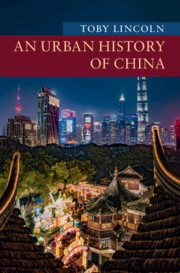Book contents
- An Urban History of China
- New Approaches to Asian History
- An Urban History of China
- Copyright page
- Contents
- Figures
- Maps
- Tables
- Acknowledgements
- Introduction
- 1 The Emergence of China’s Imperial Urban Civilization (Antiquity to 220 CE)
- 2 The Expansion of China’s Imperial Urban Civilization to the South (220–755)
- 3 The Tang-Song Transition and Its Effects on China’s Imperial Urban Civilization (907–1402)
- 4 The Flowering of Chinese Imperial Urban Civilization (1402–1799)
- 5 The Seeds of Urban Modernity (1800–1895)
- 6 Urban Modernity in Republican China (1895–1949)
- 7 The Maoist Period (1949–1976)
- 8 The Reform Era and the Present
- Conclusion
- Index
- Series page
- References
5 - The Seeds of Urban Modernity (1800–1895)
Published online by Cambridge University Press: 29 April 2021
- An Urban History of China
- New Approaches to Asian History
- An Urban History of China
- Copyright page
- Contents
- Figures
- Maps
- Tables
- Acknowledgements
- Introduction
- 1 The Emergence of China’s Imperial Urban Civilization (Antiquity to 220 CE)
- 2 The Expansion of China’s Imperial Urban Civilization to the South (220–755)
- 3 The Tang-Song Transition and Its Effects on China’s Imperial Urban Civilization (907–1402)
- 4 The Flowering of Chinese Imperial Urban Civilization (1402–1799)
- 5 The Seeds of Urban Modernity (1800–1895)
- 6 Urban Modernity in Republican China (1895–1949)
- 7 The Maoist Period (1949–1976)
- 8 The Reform Era and the Present
- Conclusion
- Index
- Series page
- References
Summary
During the nineteenth century the seeds were sown for the emergence of China’s modern urban society. The opening of treaty ports reshaped the urban system. The Grand Canal was replaced as the main link between north and south by new coastal shipping connections, and cities along the coast grew rapidly in size. Foreign powers controlled parts of treaty port cities, and they established municipal councils responsible for many aspects of urban life such as policing, water, gas, electricity, and transport systems. New urban forms first appeared in treaty ports, but then like the new government institutions crossed over into Chinese cities. At the same time, businessmen, merchants, and other groups of urban inhabitants asserted themselves through new institutions like chambers of commerce or through old ones like guilds. Chinese and foreign communities in treaty ports did business together and mingled in some social settings, such as bars or restaurants. However, for the most part the social and cultural lives of these two communities were separate, and misunderstandings were common. Although imperialism brought with it ideas, products, and technologies that were beginning to change urban life, as yet these remained beond the reach of most Chinese.
- Type
- Chapter
- Information
- An Urban History of China , pp. 135 - 161Publisher: Cambridge University PressPrint publication year: 2021

